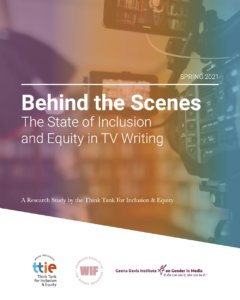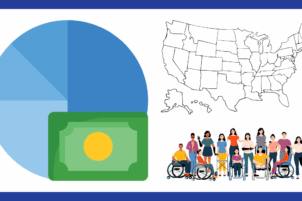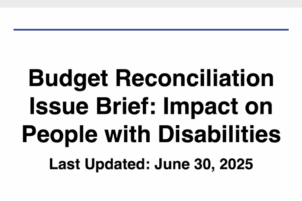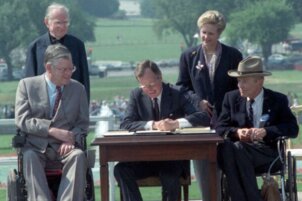Los Angeles, CA, May 6 – A new report from Think Tank for Inclusion & Equity (TTIE), Geena Davis Institute on Gender in Media, and Women in Film shows that more writers rooms are including BIPOC and women writers, but other communities, including the disability community, still are being left out. The report, titled “Behind The Scenes: The State of Inclusion and Equity in TV Writing,” covers the results of an online survey with 1,226 participants, plus results from two focus groups.
According to the report, “93.0% of writers said their most recent writers room had no Disabled or Deaf writers.” Upper-level Disabled or Deaf writers are even more scarce, with only 2.6% of writers reporting that their most recent writers room had at least one upper level Disabled or Deaf writer.
In rooms with Disabled and Deaf representation, 91.7% of Disabled writers said they were the only staffed writers from their underrepresented communities in their most recent writers room.
“Until fairly recently, disability hadn’t been included in diversity, equity, and inclusion studies, but the work we’ve done at TTIE has helped illuminate some of the reasons why including this demographic is so important,” said David Radcliff, one of two disabled steering committee members within TTIE (alongside Katherine Beattie). “Disability is the largest and most diverse underrepresented group on the planet, and it’s the only one that anyone can join at any time. The sooner television embraces that reality by incorporating us in cool stories, the better lives and opportunities become in the real world. TTIE is made up of really thoughtful people who understand the link between TV representation and the real world because we are living its effects.”
During a webinar rolling out the report, Geena Davis said, “When you increase the number of underrepresented writers in the writer’s room, the content they produce reflects that inclusion.”
But it has been harder for disabled writers to get into the room. For example, the study quotes a disabled writer as describing being shut out from diversity programs that are traditionally focused on race and gender. “I tried to get staffed as a diversity hire… [they said no] because they, at the time, didn’t consider disability diverse.”
The report advises that all TV writers rooms “collect, track, and review inclusion and equity data for all TV writers rooms, as well as within the ranks of non-writing producers, executives, and representatives,” including the Disabled and Deaf communities. Currently, the Writers Guild of America West and the Writers Guild of America East do not yet track employment data by disability status.
Another recommendation in the report is to increase Fellowship opportunities for writers. Since 2019 RespectAbility has offered a summer Lab for entertainment professionals with disabilities working behind the camera. To date, 25 of the graduates identify as writers, and several are helping to change this landscape, including Marc Muszynski, who most recently wrote for Showtime’s revival of “Dexter” and Diana Romero, who recently joined the writers room for The CW’s “The 4400.”
Lauren Appelbaum, VP of Communications at RespectAbility, head of the Entertainment and News Media outreach team and founder of the Lab, said that when it comes to ensuring accurate representation, “nothing can replace having disabled writers in the writers room and people with disabilities involved throughout the entire production process.”
Tatiana Lee, RespectAbility’s Senior Associate, Entertainment Media, added: “With the market size of the extended disability community being 63%, opening the inclusion umbrella is not just the right thing to do; it also is economically smart, as the disability market is valued at more than $1 trillion, according to Nielsen.”








